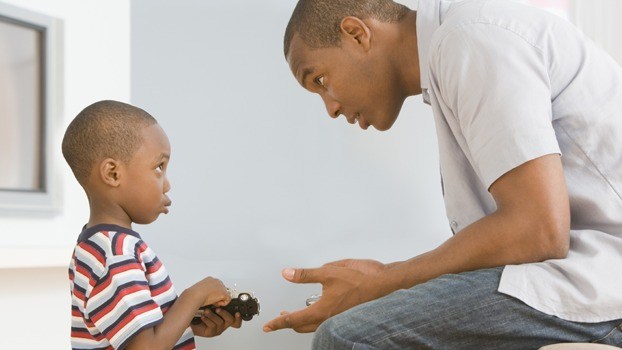When life gets tough, we want our children to know that they can come to us with anything. But an open and trusting parent-child relationship isn’t something that happens by accident. It takes a few intentional choices. Here are 5 things that can add to a healthy, trusting and positive environment that invites openness.

1. Be consistent
Consider an anchor on a ship. It’s role is to hold fast below the surface, when nothing is steady above. It is dependable and will keep a ship from drifting. Consistency in parenting creates a space where children know that what they see is what they get, no matter what. Values are consistent. Rules are consistent. Consequences are consistent. Mom and dad’s response is consistent. It doesn’t matter what might be going on – good or bad – your child can be confident that when they engage you, they know what they are going to get. This creates security. There isn’t an insecurity about the kind of mood you’re in, or if they’re catching you at a good time, or if it might be better to just leave it and not engage, just in case it’s one of ‘those days’. The security of consistency allows children to know that you are you, and they are welcome to approach you with anything and they know your immediate response will not be a guessing game.
2. Discipline firmly and fairly
Discipline is about guidance – not punishment, as many assume. As parents our role is to guide our children through the many opportunities, decisions and circumstances which they encounter and equip them to manage them well. Linked with consistency, if children know that each decision carries consequences, they will in time learn that their choices have power and determine outcomes in their life. This again builds confidence and security. When we discipline fairly and firmly, as opposed to inconsequently and emotionally, our children learn that they have power to be themselves and determine their outcomes instead of being controlled by a powerful ‘other’. Being free to be oneself is part of a healthy relationship.
3. Be honest, genuine, transparent
Nothing ruins a relationship more than dishonesty. For any relationship to thrive, both parties need to have a certain level of trust of one another. Trust is built on honesty, genuineness and transparency. What you see, is who I truly am. This is probably one of the hardest things to do – be the real you. The truth is that we are flawed individuals on our own journey’s towards our full potential. When we put up a front we break trust, we become judgemental and have double standards. Children are very perceptive and quickly realise when adults don’t ‘practice what they preach’. As far as possible, live up to the standards you set for your child – be a good example. But when you fall short, apologise, explain why you did what you did, and what you will change for the better. Use your weaknesses as opportunities to grow, and let your children get a glimpse (age appropriate) of what that growth journey looks like. When children know that you are human, they will feel comfortable sharing their weaknesses and shortcomings, fears and concerns, questions and opinions with you as well.
4. Practice empathy
Empathy is more than feeling for a person – that is sympathy. Empathy is being able to put yourself in someone else’s shoes and see things from their perspective. In fact, it actually goes further than that. Empathy is communicating this understanding to the other person in such a way that they are able to understand what is going on inside of themselves, and empowers them to act on that understanding. Empathy is like being a mirror and providing a reflection of the truth. When we look at ourselves in the mirror we gain understanding as to our present condition and we can choose to do something about it – make-up, hair gel, or nothing. Using every opportunity to understand and reflect what is happening within our children helps us know them for who they are, but allows them to develop a healthy sense of self, and then empowers them to make the necessary changes for positive growth. Empathy might take the form of giving words to emotions when a child is having a tantrum – “I can see that you are angry. Not getting what you want doesn’t feel very nice. But sweets before supper is not allowed. You can be angry, but screaming at me will not change the rule”. It might take place during or after a play date, “It seems that you were disappointed when your friend didn’t want to play the game you wanted. You didn’t say anything and just went along with them anyway. Why was that?” These moments can lead to teaching moments for better choices of behaviour or conversations about deeper issues.
5. Respond to their needs
All people have basic needs. Our behaviour is driven by our needs. If we are observant, our children’s behaviours and responses can tell us what it is that they need. Needs can be anything from basic survival (highly emotional outbursts could be because your child is hungry – a term we at home refer to as HANGRY), safety (your child may need to feel a sense of security by hovering, reach out and hug them, hold them close, rather than sending them away because they’re irritating), belonging (children may need to know you love them no matter what, trying behaviour may be testing whether or not you will truly love them as they say or trying to fit in with the crowd at school), esteem (the move for independence is frustrating when they want to do it their way, but without that space they will never achieve, and we all need to feel a sense of achievement), and self-actualisation (ultimately we all want to be all we can be, meeting the other needs helps a child towards this). Children also have love needs such as quality time, words of affirmation, gifts, acts of service and physical touch. Sometimes their behaviour is communicating that one of these areas are lacking. By responding to our children’s needs we fill up their love tanks and ensure that they are emotionally satisfied. This brings two people in a relationship closer. In healthy adult relationships both parties should seek to fill one another’s tanks. In the parent-child relationship, this responsibility lies solely with the parent. Children may respond to your love with love, but if they don’t remember parents unconditionally love their children but seek personal fulfillment from other adult relationships. Be careful not make your child your emotional crutch by relying on them for love.
As you engage with your child, creating a space where you child knows who you are, and where they can be who they are, where they are loved and their needs are met, and where they are able to understand themselves better and are equipped and encouraged to make choices and move towards better outcomes, you are creating a place of openness and trust and a place where they can feel safe no matter what is going on in their lives.
